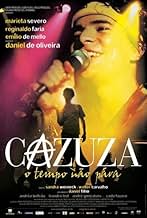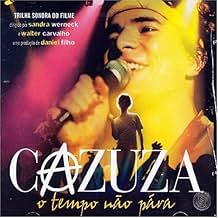Cazuza: O Tempo Não Pára
- 2004
- 1h 38m
IMDb RATING
6.9/10
4.6K
YOUR RATING
The life and times of Cazuza, Brazilian singer/poet/enfant terrible, from his start with rock group "Barão Vermelho", to his death from Aids, in 1990, showing his career, love affairs, and i... Read allThe life and times of Cazuza, Brazilian singer/poet/enfant terrible, from his start with rock group "Barão Vermelho", to his death from Aids, in 1990, showing his career, love affairs, and involvement with drugs.The life and times of Cazuza, Brazilian singer/poet/enfant terrible, from his start with rock group "Barão Vermelho", to his death from Aids, in 1990, showing his career, love affairs, and involvement with drugs.
- Directors
- Writers
- Stars
- Awards
- 23 wins & 18 nominations total
Vitor Hugo
- Bené
- (as Victor Hugo)
- Directors
- Writers
- All cast & crew
- Production, box office & more at IMDbPro
Featured reviews
The impression I had on the first hour of the movie was that it was more like a scrapbook of some memorable events in Cazuza's life rather than a biography. The scenes have no connection, it seems they're only there for you to know what happened. It looks like a story told by a fan who collects news about him. There is no drama, nothing to expect, no plot at all.
The last 30 minutes aren't really a change, but it's a more dense part, because of the discovery of the disease that is slowly killing him.
The only things that save the movie are the performance of Daniel de Oliveira, not only on stage but also off, and of course the songs and poetry of Cazuza.
The last 30 minutes aren't really a change, but it's a more dense part, because of the discovery of the disease that is slowly killing him.
The only things that save the movie are the performance of Daniel de Oliveira, not only on stage but also off, and of course the songs and poetry of Cazuza.
I was very interested in watching Cazuza. His story is well-known by most of the Brazilians that lived during the 80s rock moment. But Cazuza himself was not really explained in the movie. It was based in the book of Lucinha Araujo, Cazuza's mother, and it seems that she tried to convince herself and the others that she was a good mother and he was a good son. If you are a parent, you can take you own conclusion about this. All the self-destructive behavior of Cazuza doesn't fix in this scenario.From where it came from? For his rebellion with the homophobic world? Or it was a consequence of the inexistence of limits or punishments in a high-class Brazilian family? For who knows the story, the movie looks like a poor documentary. If Cazuza is considered the real Brazilian poet of the 80s, he deserved a better explanation.
Not being a Cazuza fan, I was remarkably impressed with how good, inspiring, and unforgettable this movie proved to be.
Some may be put off by the narrative style, which employs a significant amount of freedom in its composition. We aren't treated to a normal dramatic progression, instead being given specific segments of time covering Cazuza's adventures, relationships, dreams and hardships, as if we were looking at a picture book. This brings a sense of poetry, liveliness and urgency to the picture, even if it may displease moviegoers used to Hollywood film-making.
The Cinematography - as the narrative style - is urgent, free-floating, using only hand-held cameras. To put it quite simply, the picture perfectly captures the poetry of being young, of hoping for better days, of yearning to feel alive and connect with people.
Daniel de Oliveira's performance is easily one of the best I've seen this decade, and I hope he picks up many awards around the globe with his work - both extremely convincing and captivating. He's one of your great young actors, and I hope to see him in many more pictures.
Thankfully, this is a picture that can be enjoyed by any Brazilian, as it is a testimony of a great period of our culture. This film is not only about Cazuza - is about any kid out there with dreams in his heart and the courage to try and go some good in this world.
Congratulations to Carvalho, Werneck, Lucinha and co. for creating one of the Best Brazilian films in recent memory.
Our idols cannot - and will not - be forgotten.
Some may be put off by the narrative style, which employs a significant amount of freedom in its composition. We aren't treated to a normal dramatic progression, instead being given specific segments of time covering Cazuza's adventures, relationships, dreams and hardships, as if we were looking at a picture book. This brings a sense of poetry, liveliness and urgency to the picture, even if it may displease moviegoers used to Hollywood film-making.
The Cinematography - as the narrative style - is urgent, free-floating, using only hand-held cameras. To put it quite simply, the picture perfectly captures the poetry of being young, of hoping for better days, of yearning to feel alive and connect with people.
Daniel de Oliveira's performance is easily one of the best I've seen this decade, and I hope he picks up many awards around the globe with his work - both extremely convincing and captivating. He's one of your great young actors, and I hope to see him in many more pictures.
Thankfully, this is a picture that can be enjoyed by any Brazilian, as it is a testimony of a great period of our culture. This film is not only about Cazuza - is about any kid out there with dreams in his heart and the courage to try and go some good in this world.
Congratulations to Carvalho, Werneck, Lucinha and co. for creating one of the Best Brazilian films in recent memory.
Our idols cannot - and will not - be forgotten.
***** MAY CONTAIN SPOILERS *******
If you're not Brazil and have never lived here, you probably don't know Cazuza. But Brazilian people and lucky ones who lived in this country in the 1980's know this great composer and singer. In 1981 he begun his career as the singer of Barão Vermelho, that soon became one of the most popular Brazilian rock bands. With great heats playing on TV and radio, Cazuza and his band got fans all over the country. In 1985 he decided he wouldn't keep on playing with his mates and kicked out a solo career, that took five years. Cazuza had more success due to his talent and courage to sing everything he wanted. Unfortunately, he also kept on using drugs and with dangerous free sex habits. As a consequence, he got AIDS. Even after the discovery of this terrible disease, he kept on singing and showing no fear of showing the whole country the effects of AIDS. In 1990 he died. This is the story everybody (in Brazil at least) knows. This is what we saw on TV news, magazines and newspapers. The film shows it all in a beautiful, but at the same time strong, way. Daniel Oliveira plays the protagonist in a great way, and physically he really looks like Cazuza. Marieta Severo and Reginaldo Faria, two of the best Brazilian actors, play Cazuza's parents, who never left him alone. Walter Carvalho and Sandra Werneck direct this movie in a remarkably way. Cameras are never totally stopped. There's always some kind of movement, as if the cameramen had the cameras on their shoulders all the time. This gives a flavour of movement, that makes some kind of tense atmosphere.
My Rate 8/10
If you're not Brazil and have never lived here, you probably don't know Cazuza. But Brazilian people and lucky ones who lived in this country in the 1980's know this great composer and singer. In 1981 he begun his career as the singer of Barão Vermelho, that soon became one of the most popular Brazilian rock bands. With great heats playing on TV and radio, Cazuza and his band got fans all over the country. In 1985 he decided he wouldn't keep on playing with his mates and kicked out a solo career, that took five years. Cazuza had more success due to his talent and courage to sing everything he wanted. Unfortunately, he also kept on using drugs and with dangerous free sex habits. As a consequence, he got AIDS. Even after the discovery of this terrible disease, he kept on singing and showing no fear of showing the whole country the effects of AIDS. In 1990 he died. This is the story everybody (in Brazil at least) knows. This is what we saw on TV news, magazines and newspapers. The film shows it all in a beautiful, but at the same time strong, way. Daniel Oliveira plays the protagonist in a great way, and physically he really looks like Cazuza. Marieta Severo and Reginaldo Faria, two of the best Brazilian actors, play Cazuza's parents, who never left him alone. Walter Carvalho and Sandra Werneck direct this movie in a remarkably way. Cameras are never totally stopped. There's always some kind of movement, as if the cameramen had the cameras on their shoulders all the time. This gives a flavour of movement, that makes some kind of tense atmosphere.
My Rate 8/10
It was very disappointing because I wanted to know about who was Cazuza, why he was writing those songs and saying how bad was his family, his class and the evil Brazil.
All I've discovered was a spoiled child that want to do everything he intend to. There were no repercussion about his real personal life and how he became friend of the Barao Vermelho's members again after their separation and discussions.
After all, its pointless to watch it if you have no idea about who is that guy, that Brazilian singer... The last part of the movie should't longer, it was the most dramatic part of his life and that kind of thing works on movies biographies. Maybe his mother didn't want to watch it or reaffirm the disease his is remembered for.
All I've discovered was a spoiled child that want to do everything he intend to. There were no repercussion about his real personal life and how he became friend of the Barao Vermelho's members again after their separation and discussions.
After all, its pointless to watch it if you have no idea about who is that guy, that Brazilian singer... The last part of the movie should't longer, it was the most dramatic part of his life and that kind of thing works on movies biographies. Maybe his mother didn't want to watch it or reaffirm the disease his is remembered for.
Did you know
- TriviaCazuza's manager Zeca passed away in the same date he did, exactly twenty years later.
- ConnectionsReferenced in Mussum, Um filme do Cacildis (2019)
- SoundtracksCirco Voador
Written by Guto Graça Mello
Details
- Release date
- Country of origin
- Official sites
- Languages
- Also known as
- Cazuza: Time Doesn't Stop
- Production companies
- See more company credits at IMDbPro
- Runtime
- 1h 38m(98 min)
- Color
- Sound mix
- Aspect ratio
- 1.85 : 1
Contribute to this page
Suggest an edit or add missing content































